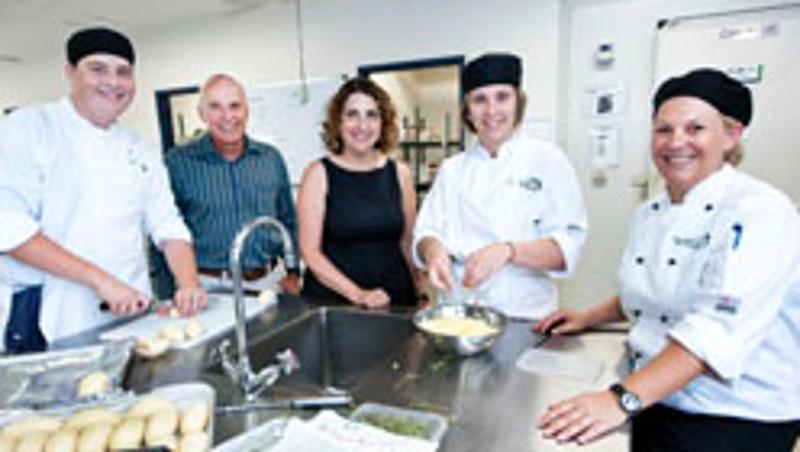
A highly successful QUT program that prepares outstanding teacher education students to work in some of Queensland's most disadvantaged schools is to go national, thanks to a $2 million grant from the Origin Foundation.
The grant is recognition of the unique program's success in producing a new breed of teachers who are ready, willing and able to work in schools where students often experience educational disadvantage.
The funding, secured with support from Social Ventures Australia, will enable the National Exceptional Teachers for Disadvantaged Schools (NETDS) program, developed by Associate Professors Jo Lampert and Bruce Burnett, from QUT's School of Cultural and Professional Learning, to be offered in up to eight universities around the country over the next three and a half years.
Now in its fourth year, the ETDS program has already graduated 43 students, 91 per cent of whom are working with students in schools identified as disadvantaged on the Index of Community Socio-Educational Advantage (ICSEA). Another 16 students will graduate as exceptional teachers this year.
One ETDS graduate in her first year of teaching is former executive chef Erin Hobbins who loves her work with Year 8 and 9 students at Loganlea State High teaching home economics and technology.
Ebullient and outgoing, Ms Hobbins feels she has found her niche after working 10 years as a chef.
"I've spent the past 10 years training people in kitchens where I worked with a lot of people from non-English speaking backgrounds. I have always loved seeing the looks of accomplishment when they had mastered something. Teaching is a natural progression for me," Ms Hobbins said.
Ms Hobbins undertook multiple field experience placements at Loganlea State High, which she says helped her move into her role as a first-year teacher there in January this year.
"Our students can come from family backgrounds where their relationships with adults may be difficult so they find it hard to trust a newcomer and you have to work a bit harder to build that trust," Ms Hobbins said.
"They tend to put new teachers through a test phase to see if they will go the extra mile and be there for them and support them.
"I have a really good rapport with them. I am straightforward and have high expectations of them, even if they start off with not much faith in themselves. With plenty of constructive feedback and encouragement, the students respond positively.
"We have a trade training centre where I teach Certificate II Hospitality (Kitchen Operations). The facility caters for school and community functions and we also run a restaurant for the students and teachers to dine at throughout the school year. The students are so keen, they turn up at 5.30am for breakfast catering functions!"
Loganlea High School deputy principal Maria Doblo said Ms Hobbins had come to the school with a preparedness to engage with the many problems students and their families face.
"As a beginning teacher, Erin had a readiness to deal with the layers of complexity that exist in the school as a result of poverty, generational unemployment and some parents with literacy and numeracy issues," Ms Doblo said.
"It is important for teachers to really know their students, to invest the time required to know their students and their families.
"For example, if parents have literacy issues, it may not be useful to just send a letter home - teachers are encouraged to phone parents and to communicate in a language they understand. It is very important to have authentic communication about their children."
Dr Lampert and Dr Burnett started ETDS in 2008 and have found that the high-achieving students are keen to join the program that runs for the last 18 months of their studies and to do their placements in disadvantaged schools.
"The grant will allows us to take the program to two other universities each year for the next three and a half years, as well as to scale up our research on the impact of NETDS," Dr Lampert said.
Dr Burnett said a third element of the scaling up would be the development of a network of scholarship in the area of teacher education and disadvantage.
"Anecdotal data from the school principals is that our exceptional graduates are doing incredible work," he said.
Origin Foundation head Sean Barrett said the ETDS program proved skilled young teachers could make an immediate and lasting impact in the lives of disadvantaged students.
"We are delighted to assist in taking this program to the rest of the country to help our young people overcome some of the disadvantages they face in achieving their potential," Mr Barrett said.
Media contact:
Niki Widdowson, QUT media officer, 07 3138 2999 or n.widdowson@qut.edu.au.
Sean Barrett, Origin Foundation, 02 8345 5140 or 0457 520 295 or sean.barrett@originfoundation.com.au
Susan Metcalf, Social Ventures Australia, 02 8004 6762 or 0412 070 019 or smetcalf@socialventures.com.au


